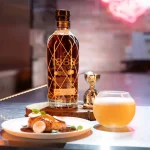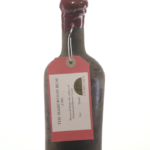Unraveling the Dark Legacy: How Rum Ties into One of Britain’s Most Abhorrent Chapters
Harewood House, an 18th-century Yorkshire country estate, is renowned for its opulence, housing exquisite art and antiques amidst perfectly manicured gardens. However, beneath this grand facade lies a cellar that holds a remarkable yet deeply complicated secret. In 2011, during a wine and spirit inventory, members of the Lascelles family, owners of Harewood House, stumbled upon shelves laden with mysterious, cobweb-covered bottles. Their curiosity led to an astonishing discovery: the contents were revealed to be rum, but not just any rum. These bottles held the oldest known rum in the world, dating back to 1780. Unraveling the origins of this aged liquor reveals a dark and shameful connection to one of Britain’s most abhorrent legacies.
The Origins of Rum and Its Ties to Slavery
The history of rum traces its roots to the island of Barbados in the Caribbean, which was one of the first English colonies in the Americas, dating back to the early 1600s. The tropical climate of Barbados made it an ideal location for sugar cane cultivation, and with sugar came the production of rum. This spirit quickly gained popularity and became a valuable global commodity.
However, the story of rum is intrinsically linked to the abhorrent chapter of slavery. The British Empire’s insatiable demand for sugar and rum led to the establishment of vast sugar plantations in Barbados. These plantations relied heavily on the forced labor of thousands of enslaved Africans, who endured unimaginable hardships while toiling in the sweltering heat. Countless lives were lost due to the brutal working conditions and cruelty of the plantation owners.
The Profits of Slavery and Their Impact
The profits generated from the sugar and rum industry flowed back to Britain, contributing significantly to the development of the modern British economy. The Lascelles family, owners of Harewood House, played a prominent role in this exploitation. They owned numerous plantations in Barbados and amassed vast wealth from the labor of enslaved individuals.
Facing the Past
Acknowledging and confronting this dark past is vital. Harewood House, with its ties to the exploitative industry, is not shying away from this truth. The estate’s curator, Rebecca Burton, is dedicated to ensuring that visitors understand the house’s history and its funding from the labor of enslaved individuals. The current Earl of Harewood, David Lascelles, has also acknowledged his family’s role in slavery, becoming part of the group “Heirs of Slavery.”
The Hidden Nature of Slavery in Britain
Unraveling the hidden nature of slavery in Britain presents its challenges. Unlike places like Louisiana, Britain lacks physical evidence of slavery, such as plantation houses or huts where enslaved individuals lived. Instead, the legacy of slavery in Britain is often seen in its stately homes, elegant objects, and monuments, which can be incongruous with the horrors of the slave trade.
Moving Forward
Since the discovery of the ancient rum in Harewood House, the bottles have been auctioned off, and the proceeds donated to local charities benefiting Caribbean communities. In Barbados, the birthplace of rum, steps have been taken to move away from its fraught British past, including declaring itself a republic in 2021.
Conclusion
The connection between rum and Britain’s abhorrent legacy of slavery is an undeniable reminder of the darker side of history. Unraveling and acknowledging this past is essential for building a more equitable future. Harewood House’s commitment to educating visitors about its dark history is a step in the right direction, promoting awareness and understanding of the atrocities that underpinned the opulence of the past. The tale of the ancient rum serves as a poignant reminder that history should never be forgotten but rather serve as a lesson for generations to come.
This article is a fictional creation and not sourced from ABC News.





